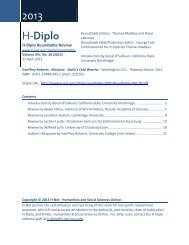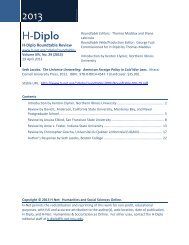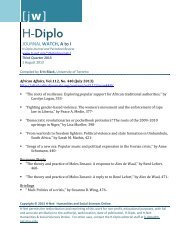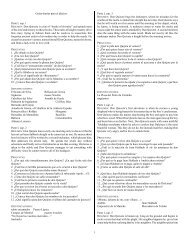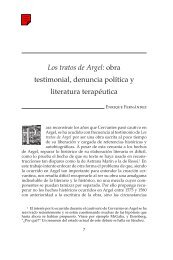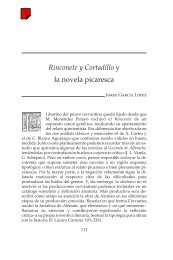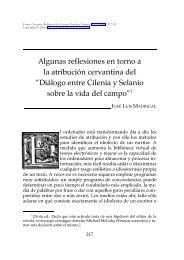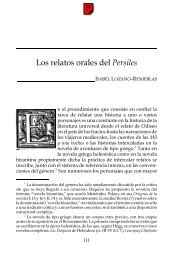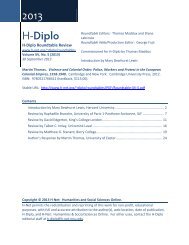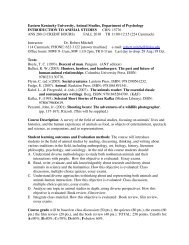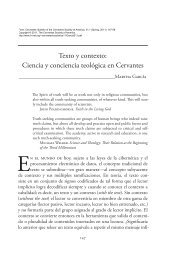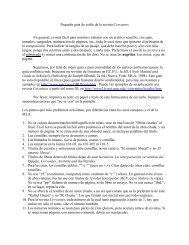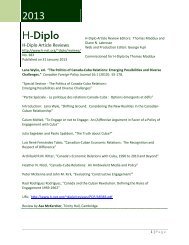The Function of Skepticism in Part I of Don Quijote - H-Net
The Function of Skepticism in Part I of Don Quijote - H-Net
The Function of Skepticism in Part I of Don Quijote - H-Net
You also want an ePaper? Increase the reach of your titles
YUMPU automatically turns print PDFs into web optimized ePapers that Google loves.
Volume 30.2 (2010) <strong>The</strong> <strong>Function</strong> <strong>of</strong> <strong>Skepticism</strong><br />
119<br />
arábigo”(102), and the authority <strong>of</strong> this historian is underm<strong>in</strong>ed because<br />
the text specifies that all Arabs are liars: “su autor [es] arábigo, siendo<br />
muy propio de los de aquella nación ser mentirosos” (103). 6 F<strong>in</strong>ally, we do<br />
not know who translated it from Arabic to Castilian because the translator<br />
is another unknown Arab (another liar, accord<strong>in</strong>g to the text): “La<br />
suerte me deparό [un Morisco aljamiado]” (102) and “roguéle me volviese<br />
aquellos cartapacios . . . en lengua castellana;” therefore, when the text<br />
says that “la traducciόn, comenzaba desta manera” (104), we have been<br />
led to believe that we are read<strong>in</strong>g a text written by an Arab historian, and<br />
we are told that Arabs are liars. This unreliable text is then translated by a<br />
Morisco, and we don’t know if it is truly a faithful translation. We are also<br />
led to believe that we do not know its provenance, because the one sell<strong>in</strong>g<br />
it is a boy <strong>in</strong> the street. F<strong>in</strong>ally, we don’t know if the text is ancient or<br />
modern, but later we learn it must be modern given the dates <strong>in</strong> the text.<br />
In short, we are led to believe that the text has no authority whatsoever.<br />
<strong>The</strong> rejection <strong>of</strong> authority is therefore present <strong>in</strong> four key elements<br />
<strong>of</strong> the text: (1) it is associated with the explicit justification <strong>of</strong> the text<br />
(i.e., to underm<strong>in</strong>e the authority <strong>of</strong> the Romances <strong>of</strong> Chivalry); (2) it is<br />
used to construct the greater part <strong>of</strong> the prologue by way <strong>of</strong> mock<strong>in</strong>g the<br />
authorities; (3) the text says <strong>of</strong> itself that it does not need any authority;<br />
(4) and f<strong>in</strong>ally, given the <strong>in</strong>formation <strong>in</strong> Chapter N<strong>in</strong>e, the text does not<br />
have authority. To sum up, Cervantes took such great care <strong>in</strong> mak<strong>in</strong>g sure<br />
that the story <strong>of</strong> <strong>Don</strong> <strong>Quijote</strong> does not depend on authority, that even his<br />
attack aga<strong>in</strong>st the authority <strong>of</strong> the Romances <strong>of</strong> Chivalry comes from a<br />
text that does not have authority (or so we are led to believe).<br />
This attitude is consistent with skeptical doctr<strong>in</strong>e. We need to recall<br />
that Sextus Empiricus argued aga<strong>in</strong>st the authorities <strong>of</strong> his time call<strong>in</strong>g<br />
them “dogmatics”, and that his works were rediscovered and <strong>in</strong>fluential<br />
dur<strong>in</strong>g the Renaissance. For Sextus Empiricus, truth is obta<strong>in</strong>ed by way<br />
<strong>of</strong> argument and direct observation, and not because the one who said<br />
6 <strong>The</strong> authority <strong>of</strong> Cide Hamete is underm<strong>in</strong>ed by two additional factors which may not<br />
be as immediately obvious as the one mentioned <strong>in</strong> the ma<strong>in</strong> body <strong>of</strong> the text: no one knows what<br />
else he has written, and as mentioned by Martín the Riquer <strong>in</strong> his edition <strong>of</strong> <strong>Don</strong> <strong>Quijote</strong> (2002),<br />
the name is <strong>in</strong>vented, common and ironic: “Nombre <strong>in</strong>ventado, pero en auténtico árabe e irónico:<br />
cide, señor, Hamete, el nombre árabe Hamid, y Benengeli, aberenjenado. Hamete era un nombre<br />
muy corriente entre moriscos” (102, n.11).



